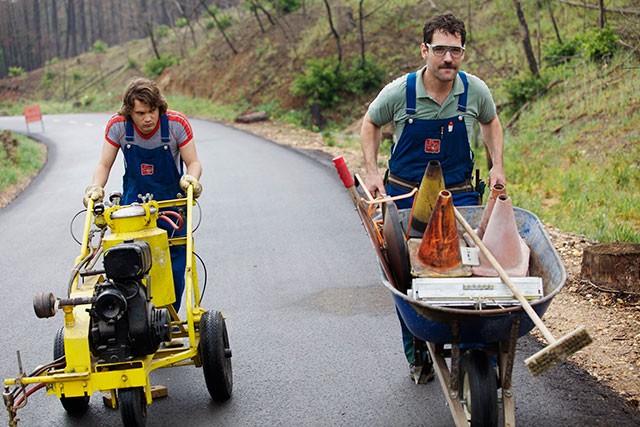“Can we just enjoy the silence?” screams Paul Rudd's uptight Alvin in David Gordon Green's minimalist comedy Prince Avalanche. It's shouted in reaction to Lance (Emile Hirsch), the feckless brother of his long-term girlfriend, whose very existence is an intrusion on Alvin's psyche. On first blush it's an easy laugh line but, when considered a part of Green's whole, there's a sly thematic triple entendre at work. What starts as a remake of the Icelandic film Either Way becomes more like Waiting For Godot, as Green's leads become stand-ins for Vladimir and Estragon, Beckett's dim-witted wanderers. Both sets of characters, in their way, seek to “hold the terrible silence at bay.”
And then there's Alvin and Lance's allegorical impact on the landscape they traverse. Set in Bastrop State Park in an area still devastated by 2011’s wildfires, the men—dressed in Super Mario Bros. overalls—service the highway that runs through the blackened park. But even as they admit that the paint they are using is poisonous, they can't help but casually expose the land and water to its toxins, eventually abandoning their equipment in a fit of rage. In a film where men burnt by life question their relationship with both the environment and one another, screaming "Can't we just enjoy the silence?" becomes its own answer.
That's a lot to take away from a movie where little happens, and it'll be interesting to see if American audiences will adjust to Prince Avalanche's slow and deceptively simple rhythms. Mostly a two-man showcase for Rudd and Hirsch, their directionless road workers seem incapable of embracing the reflective isolation their job provides them. Hired to repaint the road and fix signs and posts, they fill their day pushing a wheelbarrow, caulking reflectors and endlessly bickering. Evenings involve setting up a campsite and further resenting each other’s presence. If you can't see the eventual bond that will develop between these bruised, opposing personalities, you know little of drama.
Still, writer/director David Gordon Green takes this familiar story of accidental bromance and subtly inserts metaphors about loss and regeneration. How can a person be alone? How can a person be with others? The emotionally stunted Alvin and Lance struggle to answer these questions as they express their sexual frustrations, their inability to maintain relationships and their desire to define themselves. And, of course, these interactions are set amidst a scorched environment that struggles to heal itself and grow. In many ways, the film is telling the story of our country today, echoing the sense of loss and degradation that infects us all.
The emotions boiling beneath the main characters’ irritating exteriors give their exchanges energy and authenticity. It's easy to associate with their petty tragedies and triumphs, particularly when the Rudd and Hirsch drive the action. But Prince Avalanche isn't quite the character study it seems to want to be. Green sometimes bobbles the tone and focus, lurching from deadpan comedy to self-indulgent navel gazing to underplayed ghost story. It's as if he's unsure of how much to let us inside Alvin's condescending yet lonely psyche. And any nuance in Lance comes courtesy of Hirsch's performance.
The movie's best moment is one that was unplanned by the filmmakers. While shooting, the crew stumbled across an elderly woman, an actual resident, sifting through the debris of her destroyed home. She gave Rudd a tour and Green was savvy enough to capture their heartbreaking interactions on film. "Everything is past tense now," the woman laments. It's the kind of incisive, poetic moment Prince Avalanche strives to communicate and only occasionally delivers.
Prince Avalanche
Dir. David Gordon Green; writ. Hafsteinn Gunnar Sigurðsson, David Gordon Green; feat. Paul Rudd, Emile Hirsch, Lance LeGault (R)
Available on iTunes and Video On-Demand


